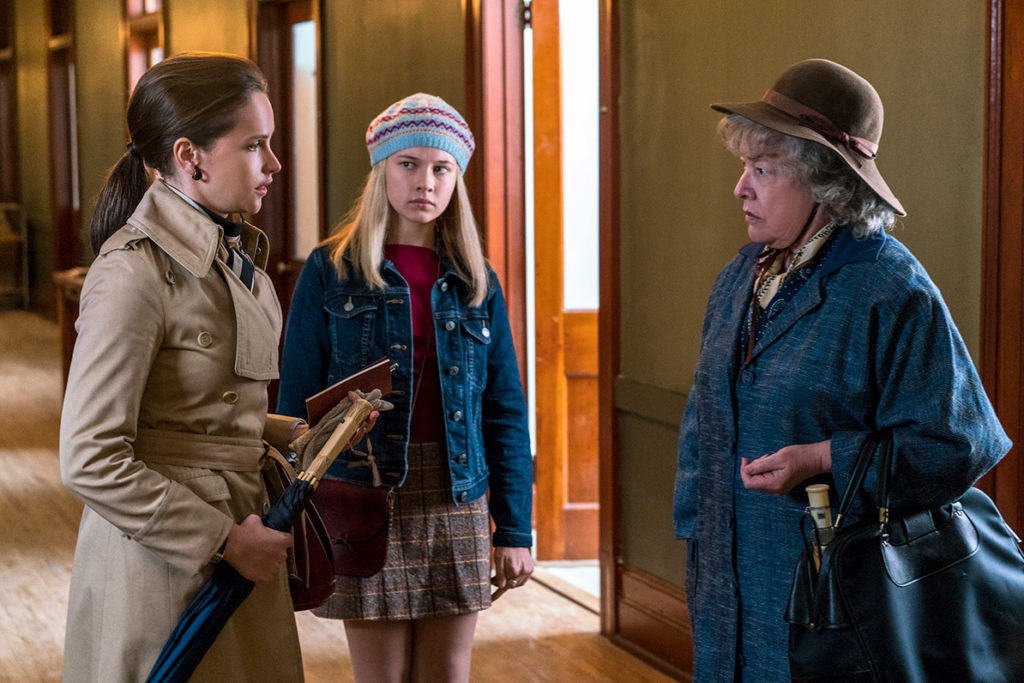
Last year, the documentary RBG attempted to honor the extraordinary life of Ruth Bader Ginsburg, charting her path from able young mind to Harvard Law student to U.S. Supreme Court Justice to feminist icon to internet meme. It was a well-intentioned effort that suffered from the usual pitfalls of cinematic hagiography, struggling to compress 85 years of the life of one of the most important legal figures in modern American history into a tidy 98 minutes. On the Basis of Sex, the new Ginsburg biopic from Mimi Leder, takes a narrower approach, homing in on two key periods in its subject’s life: her challenges as one of the few female students at Harvard, and her early labors as a litigator striving for women’s equality. Where RBG’s impact was glancing—to borrow from Supreme Court terminology, it felt more like a syllabus than a full opinion—Leder’s film lands a blow with something resembling force.
If the boxing metaphor seems peculiar, bear in mind that, despite trafficking in bookish disciplines and legal arcana, On the Basis of Sex is essentially a sports movie. Its heroine, played with poise and pluck by Felicity Jones, is the proverbial underdog, fighting to rise through the ranks and topple an entrenched dynasty. Its villains, most notably personified by Sam Waterston as Harvard’s dean of students, are pillars of the establishment, wielding their superior resources—money, power, connections—to extend their unbroken streak of competitive dominance. There are triumphs and setbacks, eager rookies and cagey veterans, strategic coaching maneuvers and breezy montages. There is even a Big Game, with a climactic moment designed to be as suspenseful as the final jump shot in Hoosiers.
It isn’t. But there is nevertheless some pleasure to be found in running this particular leg of Ginsburg’s marathon, and in watching her mobilize her intellect and aptitude. Deeply motivated and perpetually underestimated, the Ruth we meet is above all committed to achieving her goals, which differ somewhat from those of this movie. Ruth may be a fierce advocate, but while On the Basis of Sex posits one of her cases as a battle for the very future of American feminism—the phrase “radical social change” is uttered more than once, serving as either an aspirational mantra or a warning beacon—it is not especially interested in changing minds. It instead assumes, with reasonable confidence, that the vast majority of its audience will not quarrel with the once-controversial notion that men and women should be treated equally in the eyes of the law. It isn’t polemical; it’s personal.

And the people we meet in On the Basis of Sex are by and large smart, perceptive, and fun to be around. Ruth is married to Martin (Armie Hammer, superb), a tax attorney who suffers an early cancer scare before recovering and landing a lucrative gig at a New York law firm; gracious and gregarious, he supports Ruth’s advocacy while gently tempering her passion with pragmatism. They have a teenage daughter, Jane (Cailee Spaeny, who played a young Amy Adams in Vice), who shares her mother’s feminist zeal but prefers to channel it in the form of political activism, which stokes tensions in the family even as it leads to a shared sense of pride. Together, Ruth and Jane track down Dorothy Kenyon (Kathy Bates, flat), the renowned civil-rights leader who admires Ruth’s principles but questions her timing.
Ruth’s plan, coyly suggested by Martin, is to represent an unmarried man (Chris Mulkey) who’s been forbidden from taking a deduction as he cares for his ailing mother, a benefit that would easily be granted to a woman in his position. Her theory is that if she can prove the existing law discriminates against men, she’ll establish precedent which will allow future lawyers to flip the script and help level the playing field for women. (Tax deductions, appellate litigation, precedential doctrine—feel the sports-movie excitement!) For help, she enlists the services of Mel Wulf (Justin Theroux, on point), an experienced ACLU attorney who enters the scene squawking out a thoroughly ridiculous summer-camp song, giving this largely sedate film a much-needed blast of anarchic energy.

On the Basis of Sex could have used more of Theroux’s zip; Leder brings a professional (if less than dynamic) approach to the proceedings, but she struggles to invest them with any real texture. She does throw a few bones to Ginsburg enthusiasts—establishing her love of opera (as he puts on a record, Martin announces “The Marriage of Figaro” aloud, just in case you weren’t listening); recruiting the Notorious RBG herself for a late cameo—but she can’t infuse a fundamentally intellectual film with much human drama. The conflict between Ruth and Jane feels engineered, while the antagonists, including a government attorney played with reliable smarm by Stephen Root, play as more cartoonish than menacing.
This is perhaps less a failure of storytelling than a consequence of subject matter. It is virtually impossible to turn the dry work of legal research—the roaming through the stacks in the library, the drudging process of writing and editing, the painstaking preparation—into compelling screen material. As a result, Leder’s laudable efforts to enliven things tend to come off as hokey; an ostensibly rousing montage of brief-writing still involves little more than people pounding on typewriters, while the awkward rhythms of oral argument—where the lawyers take turns debating the judges rather than engaging in genuine confrontation—will always feel stunted, no matter how loudly the strings swell on the soundtrack. (Legal and feminist historians alike may be surprised to discover that gender equality was apparently achieved in the span of a four-minute rebuttal.)

That On the Basis of Sex manages to be as entertaining as it is—that it moves so smoothly, and that it occasionally transcends its own didacticism—is largely a credit to its two lead performances. Jones’ Brooklyn accent falters now and then, but she brings a clipped integrity to Ruth, a sense that she’s constantly repressing her personal indignation in the service of social progress; when Mel berates Ruth for not smiling during a moot court, you may want to scream at him, but Jones instead internalizes her fury. It’s a disciplined, anchored performance, one that’s slyly upstaged by Hammer’s quietly delightful turn as Martin. Where society demands that Ruth behave with a certain propriety, Martin has the freedom to be himself—to flirt, smirk, and relax—and Hammer gives him a wonderful looseness that brings warmth and intimacy to their marriage. I suppose there’s some irony in Jones, as good as she is, being slightly overshadowed by her male costar. But as the real Ruth Bader Ginsburg would no doubt profess, men have the right to steal movies too.
Grade: B-
Jeremy Beck is the editor-in-chief of MovieManifesto. He watches more movies and television than he probably should.

I found this review to be insulting to the thrill of our profession.
I’m suing you for defamation, and then I’m going to make a documentary about the lawsuit, which will be riveting and make MILLIONS.